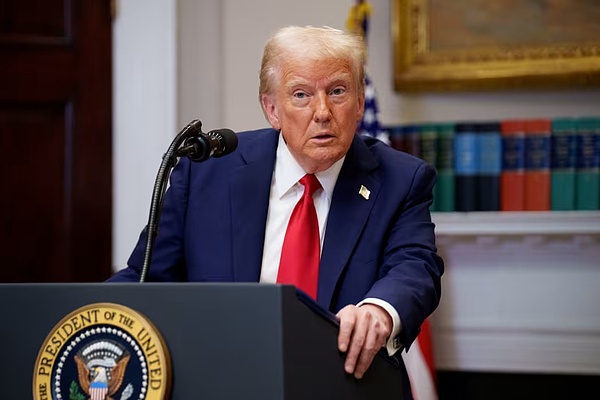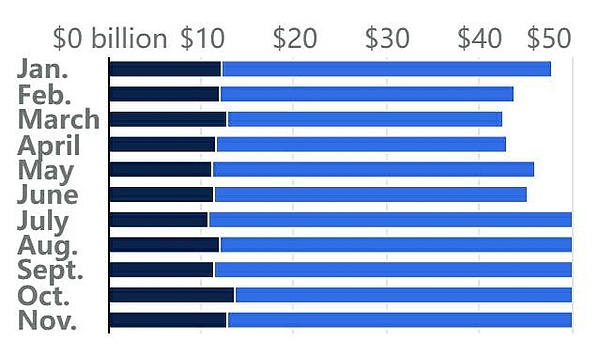Source: Barron's Chinese
When faced with the unpredictability of Trump's tariffs, investors should avoid "knee-jerk reactions" and maintain patience, as calmly weathering the market volatility is the best strategy.
In response to the U.S. President Trump's decision to impose an additional 10% tariff on China, China has quickly introduced countermeasures.
After the U.S. tariff measures on China took effect, China announced a 10% tariff on imported crude oil, certain machinery and automobiles from the U.S., and a 15% tariff on coal and liquefied natural gas products, which will take effect on February 10.
Last weekend, the U.S. announced tariffs on China, Mexico and Canada, citing issues such as illegal immigration and fentanyl. On Monday (February 3), Trump delayed the plan to impose tariffs on Mexico and Canada by at least a month, after these two countries agreed to ensure border security. The question now is whether the U.S. and China can reach a similar agreement to prevent the trade war from escalating further.
Trump is expected to hold a phone call with Chinese leaders. White House spokeswoman Karoline Leavitt told reporters on Tuesday (February 4) that the call would happen "very soon".

Julian Evans-Pritchard, head of China economics at Capital Economics, believes that China's tariffs on the U.S. may be delayed or canceled before taking effect on February 10, saying: "To a large extent, China's move is a warning to the U.S. that if necessary, China will retaliate, while also leaving room for concessions."
Evans-Pritchard also pointed out that China's countermeasures only target about $20 billion worth of U.S. goods, compared to the $450 billion worth of Chinese goods targeted by Trump. In addition, China has not raised tariffs on strategic goods such as semiconductors and pharmaceuticals.
China has also announced an antitrust investigation into Google, a subsidiary of Alphabet (GOOGL), which is not directly related to Trump's tariffs.
China has added two U.S. companies, PVH (the parent company of Calvin Klein) and Illumina (a biotech company), to its "unreliable entity list".
China's Commerce Ministry stated that these entities have "violated normal market transaction principles, disrupted normal transactions with Chinese companies, and taken discriminatory measures against Chinese companies, seriously damaging the legitimate rights and interests of Chinese companies".
The Commerce Ministry said the list only targets a few foreign entities that threaten China's national security, and law-abiding foreign entities have no need to worry.
China has also announced export controls on rare metals such as tungsten, tellurium, bismuth, molybdenum and indium, which are crucial for the manufacture of electronic products. China is a major producer of these materials.
There are different views on tariffs within the U.S. government. U.S. Treasury Secretary Scott Bessent and other economic advisors have downplayed the tariff issue, describing Trump's strategy as "escalating to de-escalate", suggesting that imposing tariffs is a negotiating tactic.
Investors welcomed the U.S. delaying tariffs on Mexico and Canada, but the tariff issue with China may be more complicated. Stifel's chief Washington policy strategist Brian Gardner believes that avoiding tariffs seems to be Trump's real plan.
U.S. imports from China exceed exports, a trend that is expected to continue in 2024
Black: Exports to China
Blue: Imports from China

Note: 2024 December data not yet released, Source: U.S. Census Bureau
When the tariff threat became a reality last Friday, Wall Street immediately saw a decline. After the U.S. government announced a delay in imposing tariffs on Mexico and Canada, the U.S. stock market regained some ground, but ordinary investors still hope to find a safer and more predictable place for their funds.
In the short term, the stock market will not be a safe haven, as there are few places to hide now. Corporate profits may be severely hit, leading to increased risks in investing in the stock market, depending on the duration of the trade tensions. Bank of America strategists estimate that the overall earnings of the S&P 500 index could decline by up to 8%.
There was a previous view that small-cap companies focused on the U.S. domestic market would benefit from Trump's protectionism, but this view has seriously misled investors: the declines in the Russell 2000 and S&P 600 small-cap indices were even larger than the S&P 500 index.
Significant stock market volatility is unlikely to disappear soon, as Wall Street is uncertain whether tariffs are a policy or a negotiating tactic, and the VIX fear index surged nearly 12% on Monday to above 18.
Michael Skordeles, head of U.S. economics at Truist, and Keith Lerner, chief market strategist and co-chief investment officer, wrote in a report that "the upward trend in the stock market has not changed, but the latest developments on tariffs highlight the potential for the market's upward momentum to be interrupted and for declines."
Therefore, in this roller coaster market, the key is to invest in stocks that can withstand the market fluctuations, such as high-dividend stocks. Procter & Gamble (PG) was one of the biggest gainers in the Dow on Monday, with a dividend yield of 2.4%. Stocks like UnitedHealth (UNH), Verizon (VZ), Merck (MRK) and IBM (IBM) that pay substantial dividends also saw gains.
Julie Biel, chief market strategist at Kayne Anderson Rudnick, told Barron's that investors have learned from Trump's first term that dividend-paying stocks are a good way to weather market volatility.
Mike Morey, chief investment officer of Integrity Viking Funds, is also bullish on dividend stocks, but he believes investors don't need to be limited to more conservative defensive stocks.
Broadcom (AVGO) is the largest holding in Morey's Integrity Dividend Harvest Fund, which also holds Corning (GLW) as well as energy and utility stocks like TC Energy (TRP) and NextEra Energy (NEE), and large banks like Citigroup (C) and JPMorgan Chase (JPM).
Morey said: "We try to keep volatility relatively low, focusing on companies that not only pay dividends but also plan to increase them. Dividend stocks have been overlooked due to exciting news in the AI space, so there are many attractive opportunities."
Investors can also consider traditional safe-haven assets like U.S. Treasuries and gold. U.S. Treasury yields fell on Monday, which may be a sign that investors are flocking to this market amid market turmoil. Gold, a proven hedge against volatility, has recently hit a record high of $2,850 per ounce.
Thierry Wizman, global FX and rates strategist at Macquarie, believes the U.S. dollar may continue to rise as investors seek safe havens.
Wizman wrote in a report that the dollar "will attract capital inflows as a safe-haven currency in times of uncertainty", and he also believes that "if the tariff issue persists, risk markets will come under pressure, as investors generally believe that tariffs will slow GDP growth, reduce corporate profit margins, and lead to higher costs."
However, when faced with the unpredictability of Trump's tariffs, investors should not have "knee-jerk reactions", as negotiation is part of Trump's "script", and anything can change instantly, just like Trump's delay in imposing tariffs on Mexico and Canada on Monday.
Tony Roth, chief investment officer of Wilmington Trust, said: "It's hard to know what the ultimate outcome will be, and investors need to be patient and calmly weather the market volatility."







